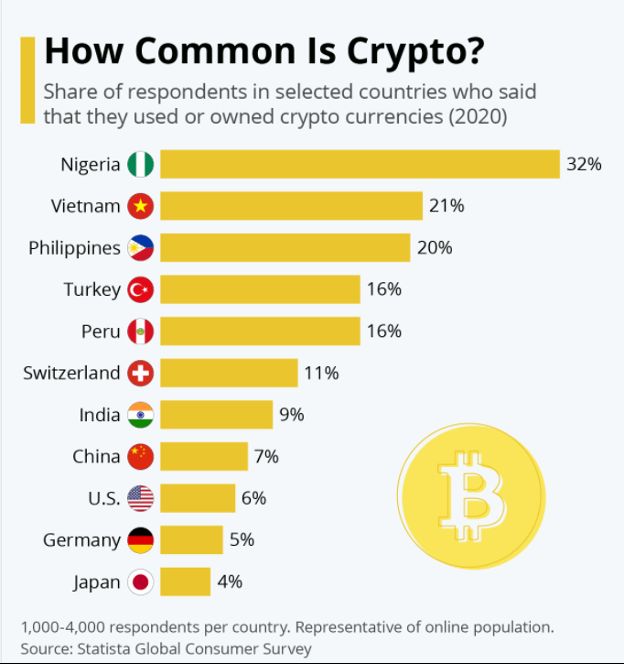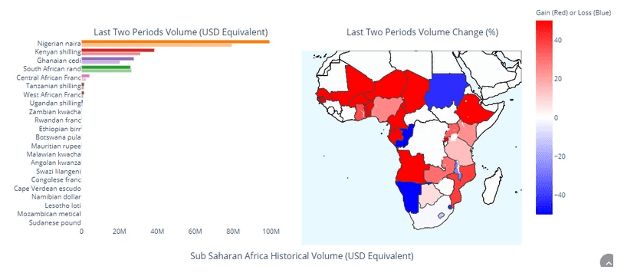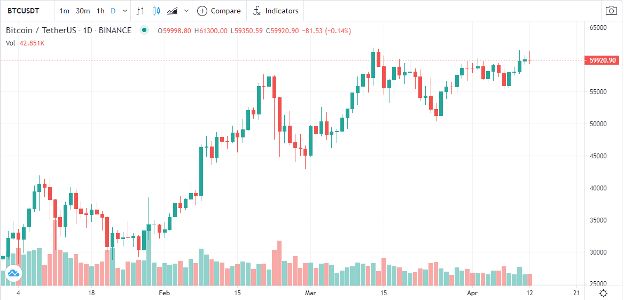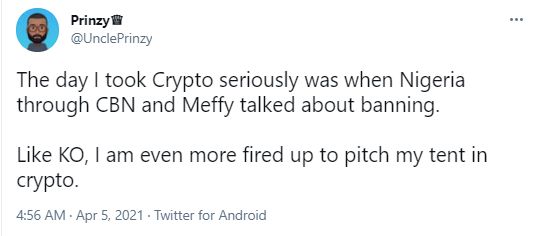Nigeria has earned itself the title of Africa's bitcoinnation. An unstable Naira contributes to the popularity of thecryptocurrency. But Nigeria's central bank remainscritical of bitcoin.
Bitcoin, the leading cryptocurrency, has seen its value balloonby more than 100% year-to-date, soaring to an all-time high of morethan USD 60,000. Nigerians, many of whom are battling poverty, would be hard-pressed tomiss out on those gains. This is especially true considering thatthe unemployment rate in the most populous African nation was 33.3%as of last quarter, with more than 23 million Nigerians out ofwork.
Enter bitcoin, which has been a safe-haven investment as well asa faster and cheaper payment method for the growing segment of thepopulation that is catching on. In fact, Nigeria last year rose to the top of theheap for bitcoin trading at USD 400 million in volume, surpassingtransactional volume in nearly every other jurisdiction - with the exception of the United Statesand Russia - as traditional asset classes lose their appeal incomparison and the local currency, the naira, remains underpressure. Nearly one-third of Nigerians who participated in a Statista poll said that they usedor owned cryptocurrencies, more than any other country representedin the survey.

Source: Statista
Nigeria also stands out in all of Africa, as the toppeer-to-peer bitcoin trading nation on the continent based onbitcoin trading volume. Nigeria's P2P BTC trading volumesurpassed USD 99 million in the first quarter of 2021. Kenya is adistant second at USD 34.8 million followed by Ghana and SouthAfrica at USD 27.4 million and USD 25.8 million,respectively.

Source: Business Insider/Useful Tulips
The robust bitcoin trading activity in Nigeria has earned thecountry the title of Africa's Bitcoin Nation. A 27-year-oldNigerian office worker who was spotlighted by theAFP, Chigoziri Okeke, described how he first invested incryptocurrencies five years ago with the intention of just making apayment. When his crypto wallet's value increased by 10% in afew short days, however, he was hooked and started directing apercentage of his salary toward the market. Today, thisinvestor's crypto portfolio is worth USD 50,000, comprisingvarious digital assets.
In addition, Google searches of bitcoin in Nigeria surpass thatof any other jurisdiction, according to Nairametrics.com. Bitcoin appealsespecially to the West African nation's millennial generation,who are looking to the flagship cryptocurrency as a store-of-valueasset as well as a way to circumvent the hoops they must jumpthrough to open a traditional investment account. Withthe bitcoin price most recently hovering at USD 60,000, Nigerianshave reason to be excited. At this price, one bitcoin couldreportedly buy someone a three-bedroom apartment in Lagos' Ajahneighborhood.
Unstable Fiat Currency
A big part of bitcoin's popularity is due to Nigeria'sunstable naira. The International Monetary Fund (IMF) has drawn aline in the sand, stating that Nigeria's fiat currency is"overvalued" by more than 18%. The IMF wants Nigeria todevalue its fiat currency, but the African nation's governmenthas said no way.
Nigerian President Muhammadu Buhari blames "globaloutflows" triggered by COVID-19 for the unstable naira andbelieves that devaluing it further after doing so twice in 2020would only exacerbate the already sky-high inflation rate, which iscurrently in the double-digits at more than 17%. This would weakenNigerians' purchasing power even more. Nigeria's centralbank slashed the naira's value by close to one-quarter lastyear.
Meanwhile, not only has bitcoin been generating returns handover fist, but it has also been thrust into the global spotlightamid the SARS-related protests in Nigeria. According to reports,Nigeria thwarted financial payments toward police brutalityprotests, which only led the supporters to donate bitcoin instead.Twitter and Square CEO Jack Dorsey backed this movement, which onlybrought more attention to the country andcryptocurrencies.

Source: CoinGecko/TradingView
Mixed Signals
Nigeria's central bank has been highly critical of bitcoin,warning as recently as February that "cryptocurrencies arelargely speculative, anonymous and untraceable."
Nonetheless, the Central Bank of Nigeria can't stop thepopulation from accessing the flagship cryptocurrency, thanks tothe peer-to-peer nature of bitcoin, which was inherently designedto circumvent third-party service providers like banks. Bitcoincreator Satoshi Nakamoto, whose real identity remains a mystery,defined the first cryptocurrency in thewhitepaper, which was published in 2008, saying:
"A purely peer-to-peer version of electronic cash wouldallow online payments to be sent directly from one party to anotherwithout going through a financial institution."
The Central Bank of Nigeria has since backtracked from itsremarks slightly, maintaining that it has not placed a blanket banon cryptocurrency trading. It is a tangled web, however. Thecentral bank instead said that it is doubling down on a 2017 law that bans institutions supportingcryptocurrency transactions.
Financial institutions that don't follow the rule will bethe target of "regulatory sanctions" by the central bank. Any users, whetherindividuals or organizations, will see their accounts shuttered ifthey continue to perform crypto transactions. Local fintechcompanies that have supported cryptocurrency transactions,including Flutterwave, Buycoin, and PiggyVest, have reportedlyinformed their customers about the policy changes, in response towhich users have been withdrawing their crypto funds indroves.
Even though institutions might be banned from supportingcryptocurrency trading, individuals are still free to trade them.The central bank is sending mixed signals, to say the least, aslocal banks were instructed by the central bank to refrain fromdoing business with customers who transact incryptocurrencies.
"The CBN did not place restrictions from useof.cryptocurrencies and we are not discouraging people from tradingin it. What we have just done was to prohibit transactions oncryptocurrencies in the banking sector," stated Adamu Lamtek, according to Decrypt, citingToday NG.
Since the restrictions were imposed on Nigeria's cryptotrading industry, rather than disappearing, the industry has flexedits muscle for its nimble nature. In a few short months, they havebeen quick to build P2P exchanges that circumvent the crypto ban onfinancial institutions. The restrictions have funneled moreactivity to over-the-counter (OTC) venues while a makeshift P2Pmarket is similarly expanding. Danny Oyekan, founder of globalsocial payments application Coins App, is cited by Decrypt as saying,
"So basically, the ban only forced the fiat channelsunderground."

Source: Twitter
In Nigeria, cryptocurrencies are regulated by the country'sown Securities and Exchange Commission, which last year stated that it would classifycryptocurrencies as securities unless they are proven otherwise bythe asset's issuer or sponsor. In February, Nigeria's SEC said that cryptoregulation was going to be placed on the back-burner amid thecentral bank's crypto crackdown. Despite the uncertainty,Nigerians are showing no signs of relenting in their pursuit to ownbitcoin and are increasingly relying on P2P trading platforms to dojust that.
While it is unclear what the Central Bank of Nigeria'spolicy on bitcoin will look like exactly, one could look to otherAfrican nations to get a sense of the landscape. Morocco, forinstance, has banned cryptocurrencies, but somehow bitcoinis still considered popular there, based on skyrocketing BTCtransactions. In the meantime, policymakers in the North Africannation are exploring the benefits of a central-bank digitalcurrency (CBDC).
Kenya, meanwhile, is a hotbed for cryptocurrency transactionsas regulators look to strike a balancebetween supporting innovation and protecting investors. Ghana,meanwhile, has taken a stance similar to Nigeria and has urged itspopulation to refrain from trading cryptocurrencies.
This post is guest authored by Gerelyn Terzo of Sharemoney.
Reach out to us at [email protected]. We would love to have achat.